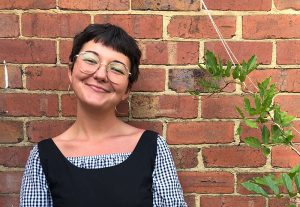The 2022 IPEd Student Prize has been awarded to Penelope Robinson, a student in the Master of Writing & Publishing Program at RMIT University.
Robinson was awarded the prize for her essay, How Australia’s Trade Publishing Industry is Challenging the White Standard of its Workforce. Her essay will be published in the coming weeks on the IPEd website.
The judges shortlisted an additional five entries for honourable mention:
- Madeleine Delany (Curtin University), “Telling It True: The Path to Accurate Representation of the Published Australian Indigenous Voice”
- Lauren Fisher (Macquarie University), “The Future of Editing in the 21st Century”
- Katie Forbes (University of Queensland), “Structural Report: The Church Tree”
- Kirsty Horton (Curtin University), “BookTube and the Publishing Industry: A Study of the Commercial Relationship between YouTube Content Creators and Publicists”
- Monique Moate (Macquarie University), “Essay on the Future of Editing”.
The Standing Committee on Awards and Prizes extends warm congratulations to Penelope and the other five shortlisted students.
About this year’s entries
This year, the IPEd student prize organisers received a record 26 entries from university students in New South Wales, Queensland, South Australia, Victoria and Western Australia. We received a set of outstanding entries, all of which showed a sophisticated understanding of the profession and excellent application of editing skills.
In their report to IPEd, the judges wrote: “The quality of submissions was extremely high, thus giving the judges great confidence that the future of editing and publishing in Australia is in strong, capable hands”.
What the judges said about the winning entry
The judging panel was unanimous in selecting Penelope Robinson’s essay for the 2022 IPEd Student Prize. In their report to IPEd, the judges wrote:
Her essay investigates the lack of diversity in Australia’s trade publishing industry using a combination of scholarly sources; industry presentations, reports and articles; and interviews with Australian publishing professionals. The essay builds on previous research about the publishing industry’s obstacles to diversity, in both local and global contexts, and Robinson admirably pulls this research together into what she identifies as the three most fundamental and challenging obstacles: “the university problem”, “who can afford to work for free?” and a paucity of “diverse leaders and industry culture”. Robinson also compiles in one place the schemes and initiatives that, to date, the Australian publishing industry has undertaken to remedy the lack of diversity and inclusion in its workforce.
The judges especially admired Robinson’s well-organised and well-expressed argument. The essay squarely balances its sources against Robinson’s own words, and the inclusion of interviews as a research source is a resourceful touch. The judges had much praise for this essay that will be of great interest to both scholars and publishing professionals. Robinson makes a valuable contribution to our collective understanding of a timely and important topic.
This year’s judges
The 2022 IPEd Student Prize was judged by three IPEd members: Per Henningsgaard, Eugen Bacon and Ann Philpott.
The Standing Committee on Awards and Prizes extends special thanks to the judges for generously giving their time to assess the entries, particularly as judging was conducted over the Christmas and New Year period. Thanks to Per Henningsgaard for chairing the judging panel.
About the IPEd Student Prize
The IPEd Student Prize acknowledges excellent work by a student of editing. It is designed to enhance the profession of editing and support student work on issues relevant to the industry.
It is awarded annually for a piece of work submitted as part of a tertiary qualification in editing, publishing or another discipline with a focus on editing.
The prize is open to any tertiary-level student enrolled in an editing or publishing program at a New Zealand or Australian tertiary institution.
Entries for the 2023 Prize will open in September 2022. More information is available on our awards information page.
Meet Penelope Robinson, winner of the 2022 IPEd Student Prize
We interview Penelope Robinson, who won the 2022 IPEd Student Prize for her essay, How Australia’s trade publishing industry is challenging the white standard of its workforce.
Tell us a little about yourself. 
I’m originally from a small coastal town in New South Wales but moved to Melbourne for my undergraduate degree in 2015. I’ve lived in Brunswick ever since where I spend my free time reading in the park, walking the Merri Creek trail or swimming at my local pool. I’m a bookseller by trade and currently manage a bookshop in the CBD.
How did it feel to hear that you were the winner of the 2022 IPEd Prize?
Our course coordinator circulated an email to my class when submissions for the 2022 Student Prize opened last year and I put forward my paper on a whim. I was proud of the research and my work but, up against students across the country, I never dreamed I would win. I woke up to the news while visiting my family in England and, after screaming with excitement, had to reassure my concerned dad in the next room that I wasn’t in any immediate danger. It’s such an honour to receive this notable industry award and for my paper to be acknowledged by an institution like IPEd.
Tell us something about how you decided to pursue your studies in writing and publishing.
I’ve always been passionate about writing and storytelling, and thought that during my undergraduate degree I would become a journalist. It wasn’t until I started working in a bookshop in 2017 that I realised my real love was for books and all that they give to the world. Any avid reader will know the joy of a great story, whatever its genre, and I knew I wanted to work in an industry that helps those stories be told.
What initially drew you to your essay topic on diversity challenges in trade publishing?
It’s a topic I’ve always been interested in and cared deeply about. When we were asked to explore an issue relevant to professional editing, writing or publishing practice, I was aware of the publishing industry in general taking steps to remedy the lack of diversity in its workforce but I wanted to know the nitty-gritty: what are the main obstacles to workforce diversity that need to be addressed? What is specifically being done and where? How practical are these schemes and in which parts of the industry is there still a lack of this meaningful work? The goal was to create a resource for Australian trade publishing that illustrates how far we’ve come and how far we still need to go.
What are your plans after you graduate from RMIT?
I’ve developed a love for the craft of editing throughout the RMIT master’s program. I enjoy learning by doing, picking up on the small details, knowing the rules and breaking them when necessary, and working with an author to hone a piece of writing. It’s like building a house; if grammar, punctuation, structure and voice were its foundation and walls, and the author’s vision the finished home. I hope to enter the editing profession and have a career doing this building work, with the goal of one day working on larger manuscripts.
Do you have any interesting plans for the $500 IPEd Student Prize money or reference books?
I can’t wait to dive into the books and subscriptions that come with the prize. They’ll be incredible resources to have at hand for the rest of my degree and will continue to assist me when editing in the future, whether freelance or inhouse. As for the prize money, I plan on being very boring and putting it straight into my savings. I will switch from full-time to part-time work during the semester to commit more time to my coursework so it will be a wonderful relief to have an extra cushion for those unforeseen expenses that pop up while studying.
What’s something that most people don’t know about you?
I don’t know my left and right. I’ve tried and tried to memorise them but I just don’t have the instinct. Whenever I need to figure out directions on the spot, I pretend to write with a pen in the air to know which is which. I’ve been seriously considering getting L and R tattooed on each hand to solve the problem once and for all.

